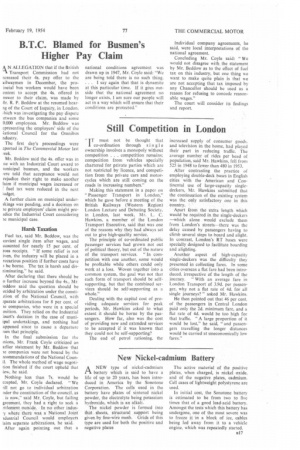B.T.C. Blamed for Busmen's Higher Pay Claim
Page 51

If you've noticed an error in this article please click here to report it so we can fix it.
N ALLEGATION that if the British
Transport Commission had not acreased their 4s. pay offer to the ailwaymen in December, the proincial bus workers would have been ontent to accept the 4s. offered in nsvv-er to their claim, was made by 4r. R. P. Beddow at the resumed hearrig of the Court of Inquiry, in London. ..hich was investigating the pay dispute etwcen the bus companies and some 0,000 employees. Mr. Beddow was ztpresenting the employers' side of the Iational Council for the Omnibus ndustry.
The first day's proceedings were ported in The Commercial Motor last 'eek.
Mr. Beddow said the 4s. offer was in ne with an Industrial Court award to tunicipal busmen, and the workers fere told that acceptance would not rejudice their right to make another laim if municipal wages increased or fuel tax were reduced in the next udget.
A further claim on municipal undertkings was pending, and a decision on ie private employers' claim might pre'dice the Industrial Court considering le municipal case.
Harsh Taxation
Fuel tax, said Mr. Beddow, was the eaviest single item after wages, and ccounted for nearly 15 per cent. of ross receipts. "If some relief is not iven, the industry will be placed in a recarious position if further costs have be borne. The tax is harsh and disriminating," he said.
After declaring that there should be o further increase beyond the 4s., Mr. ,eddow said the question should be ecided by arbitration under the constiition of the National Council. with :parate arbitrations for 8 per cent, of se companies, who were in a special osition. They relied on the Industrial :ourt's decision in the case of muniipal undertakings, and nothing had appened since to cause a departure ram that principle.
In the final submission for the Mons, Mr. Frank Coyle criticized an arlier statement by Mr. Beddow that le companies were not bound by the :commendations of the National Courtii. The whole method of wage negotiLion finished if the court upheld that iew, he said.
Nothingless than 7s. would be ccepted, Mr. Coyle declared. "We ill not go to individual arbitration rider the constitution of the council, as is now," said Mr. Coyle, but failing greement, they had a right to seek a ritlenient outside. . In no other indus.-y where there wa.s a National Joint idustrial Council would employers (aim separate arbitrations, he said. After again pointing out that a
national conditions agreement was drawn up in 1947, Mr. Coyle said: "We are being told there is no such thing. . . . I say again that that is dynamite at this particular 'time. If it goes outside that the national agreement no longer exists, I am sure our people will act in a way which will ensure that their conditions are protected." Individual company agreements, he said, were local interpretations of the national agreement.
Concluding Mr. Coyle said: "We would not disagree with the statement by Mr. Beddow as to the effect of fuel tax on this industry, but one thing we want to make quite plain is that we are not accepting that tax imposed by any Chancellor should be used as a reason for refusing to concede reasonable wages."
The court will consider its findings and report.




























































































